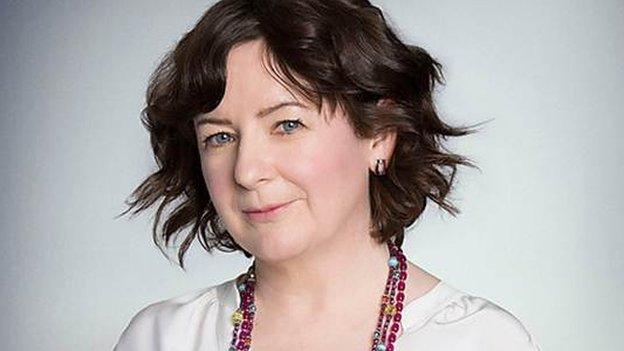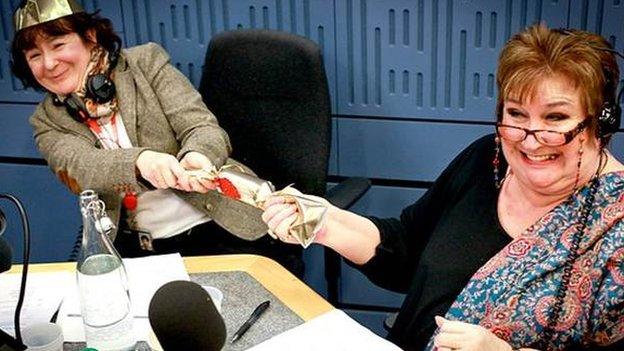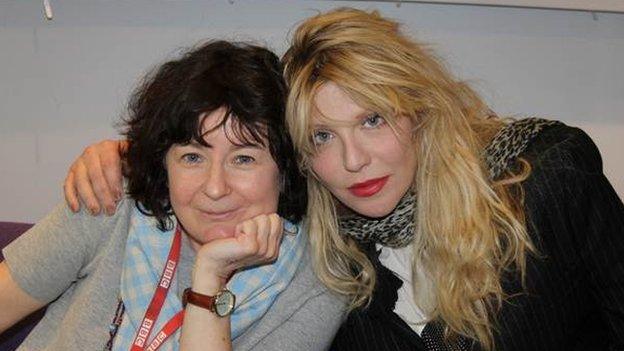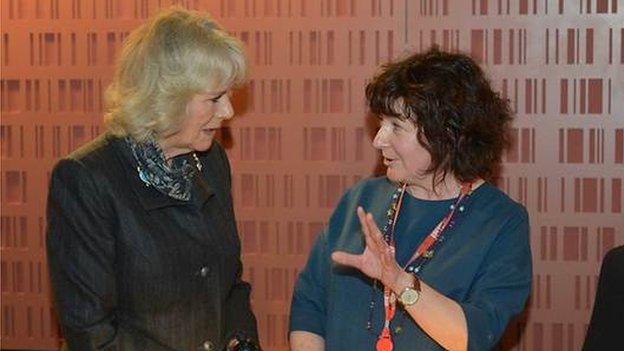Jane Garvey: Top 10 tips for hosting Woman's Hour
- Published

Jane Garvey is a presenter on Radio 4's Woman's Hour. Before sharing presenting duties with Jenni Murray, she was part of the team who launched 5 Live when it started in 1994, presenting the Breakfast and Drive programmes.
She started her broadcasting career in local radio in 1987, living in a bedsit and earning £2,600 a year (she still has the memo congratulating her on her appointment).
Here are her top 10 tips for presenting Woman's Hour.
1. Act on your dreams
I got into broadcasting because one day in 1987, I actually acted on my dreams. My dream had always been to work for BBC Radio.
Slightly to my surprise, nobody came to find me to offer me this dream job and that's my number one tip: don't expect anyone to come and get you.
So that day, at the age of 23, back living with my Mum and Dad, having been sacked from a job in advertising, I got off my backside and I wrote a lot of letters to radio stations all over the UK, asking for work experience.
I got a job at Radio Wyvern in Worcester. After 18 months there I got a job in BBC local radio, then I moved to 5 Live and now I'm at Radio 4. Nothing comes to you without effort, I'm afraid!
2. Control your nerves and keep them talking
It was really daunting the first time I did Woman's Hour and I was incredibly nervous. Woman's Hour is like a stately galleon in full sail.
It is a programme far bigger than anyone who will ever present it. The Radio 4 listeners know what they like and they like what they know and the programme attracts some pretty big names.

Jane Garvey (l) says she and Jenni Murray have developed their own personal styles for hosting the show
It doesn't matter how experienced you are, you get really nervous and the best way to cope with nerves like that is to let them become your adrenalin.
Try and keep big name guests talking for as long as you possibly can: we were told we'd get six minutes with David Cameron last year and in the end we got about 13 minutes because I just kept talking and he felt obliged to answer!
3. Learn to listen and don't take it all too seriously
Relax enough, if you can, to listen to the person you are speaking to and then the next question, in an ideal world, should suggest itself. My producers may not agree with that, but I think that's what you should do.
Radio 5 Live is a sort of allotment and Radio 4 is a manicured back lawn in Surbiton. I think you need to aim for something in the middle. Woman's Hour isn't easy, it's a different kind of challenge.
When I first arrived, it was very much Jenni's way of doing the programme and she does her programme her way and I do mine my way.
I'm sure that there are some people who can't tell the difference. You should never exaggerate your own importance or significance - don't take it too seriously.
4. Not everyone is going to like you - get over it
When you come in as a new presenter, it can take a long time to win listeners over. When people say negative things, it can be quite hurtful. Nobody wants to be criticised.
I think that to be disliked is actually better than for people to be indifferent to you, but that's probably a psychological thing, I've had a word with myself and developed that way of thinking.

Courtney Love is just one of the many stars Garvey has talked to
Radio is a place for the introverted egomaniac. I think that Terry Wogan came up with that expression and I think that's very true. Not everyone is going to like you - get over it.
5. Be a team player and find your own routine
When I'm presenting Woman's Hour, I arrive at about 7.20am. We have a meeting about the programme and then I talk through the items with the individual producers.
I always have a flat white just before Woman's Hour starts, but I don't throw my toys out of the pram if that doesn't happen.
I like to sit in the office with the rest of the team because I always have and I don't feel you can prepare for a programme, which is - I hope - a companionable way of spending 45 minutes, by sitting on your own. I don't want to do that.
6. Learn to compartmentalise your personal life
I had a fairly public divorce from a television presenter. It really wasn't a barrel of laughs and I had a really trying six months when I would come home and the Daily Mail would be waiting for me.

Garvey says going to important events - including those with royal guests such as the Duchess of Cornwall - can be a big responsibility
You really do have to compartmentalise your personal life to a degree. When I'm in that studio, my mind is pretty cleared of anything except what we have to get through in the next 45 minutes.
Having said that, I have lost my marbles on air a couple of times and inevitably it has been purely because I've lost concentration.
7. Learn not to worry and stop aiming for perfection
You have to learn to stop aiming for perfection, particularly on live programmes. The appeal of a live programme is the potentially ragged nature of it. Don't expect not to make mistakes: that is crazy.
You are going to stumble; you are going to lose your verbal footing from time to time. Don't obsess about it, just carry on and the audience won't notice it either. They're far too busy and they couldn't care less.
Nobody is going to employ you for your skill of not stumbling, that's not an attractive enough asset and that's not what the best kind of radio is about.
8. Don't interrupt all the time and remember everyone has a story to tell
Sometimes a silence or a pause speaks volumes and with experience as a presenter, you learn when not to interrupt. Let your interviewees find the words themselves. It will sound much better if they do.
There is no such thing as a boring person, but there are some terrible interviewers. Okay, well, there are some boring people, let's be honest, we all know some, but on the whole there aren't many and everyone has a story to tell.
Some guests might give one-word answers while others engage with you in a somewhat artificial way and use your Christian name a lot.
I've had people come on the programme and call me Jenni throughout the interview and if it's actually not your name, it doesn't sound great.
9. Engage with your listeners
I do engage with people on Twitter and I think that's an important part of my role as a presenter on Woman's Hour. It's a great way of getting guests and understanding what our audience likes.
I've got about 28,000 followers which is not a lot, as my kids always remind me. They just laugh and point out that Justin Bieber has 400 million or something.
With a job on Woman's Hour came a role which I hadn't been expecting in terms of going along to events and giving talks to students about women and broadcasting and I absolutely do feel a responsibility to do that sort of thing, I think we should.
10. Have faith in your own ability and enjoy it
School Reporters present Woman's Hour with Jane Garvey
There is no reason why anyone can't be a presenter and I mean that. Get your voice out there, do a podcast in your bedroom, get yourself heard and be pushy, even if it's not in your nature. If I can do it, anybody can.
I had this residual faith in my own ability and I knew it was just a case of me getting a foot in the door. Once you've got there, you can prove your worth. You just need to get in.
Enjoy it. I honestly do wake up on a Monday morning and I'm excited about going in to work and that's great. Try to be grateful for a job you enjoy, I am and it is a huge privilege.